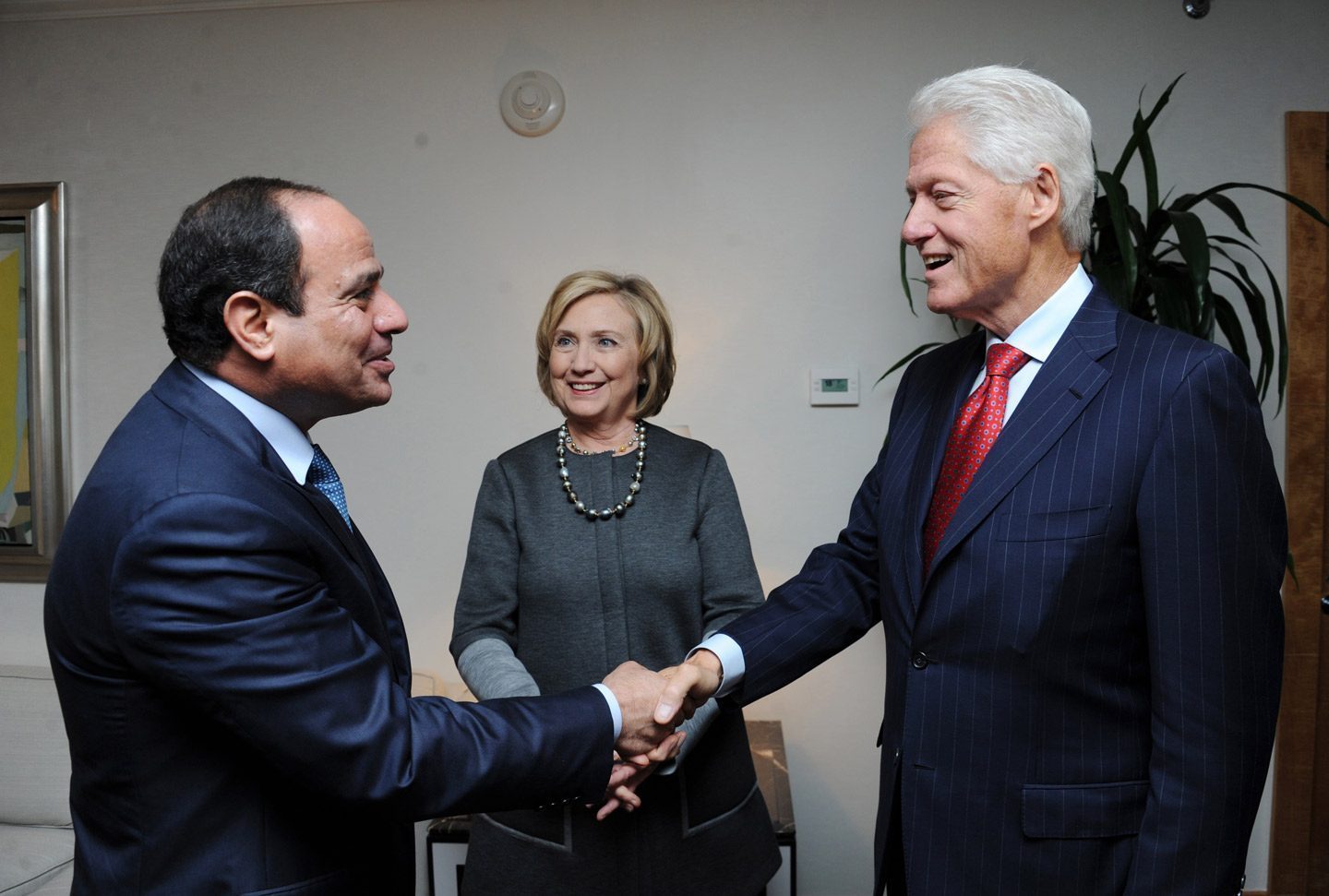
Hillary Clinton has been criticizing Donald Trump for praising dictators; but practically Clinton herself has a history of alliances with strongmen in Egypt, Saudi Arabia, and Honduras.
The Intercept has published an article titled: “Donald Trump Praises Dictators, But Hillary Clinton Befriends Them” concluding that both US presidential candidates are not against dictators.
Clinton’s top foreign policy adviser Jake Sullivan warned last week that Trump’s “praise for brutal strongmen knows no bounds.” In this context, the Clinton campaign released a video compilation of Trump’s comments about North Korean dictator Kim Jong Un, Russian President Vladimir Putin, and former Iraqi and Libyan dictators Saddam Hussein and Muammar Gaddafi.
Moreover, Clinton accused Trump of trying to become a dictator himself at a California rally. “We’re trying to elect a president,” said Clinton, “not a dictator.”
“Practically speaking, however, the choice voters will face in November will be a candidate who praises dictators and a candidate who befriends them,” said the Intercept.
Clinton used to have strong ties with Egypt’s former dictator Hosni Mubarak and his wife as “friends of my family.” Mubarak ruled Egypt under a perpetual “state of emergency” rule that involved disappearing and torturing political opponent, and police killings became a phenomenon.
Egypt under Mubarak’s autocratic rule lacked any form of democracy or freedom of speech and expression. However, the U.S. relation with Mubarak was moving in its track despite the dictator’s practices.
U.S. gave Mubarak $1.3 billion in military aid per year, and when Arab Spring protests threatened his grip on power, Clinton warned the administration not to “push a longtime partner out the door,” according to her book Hard Choices.
After January revolution 2011, Mubarak was overthrown and Mohamed Morsi won the presidency in Egypt’s first democratic elections. But the Egyptian military launched a military coup in 2013 led by Abdel Fattah al-Sisi that ousted Morsi, and the US Administration kept silent .
Al-Sisi suspended the country’s 2012 Constitution, appointed officials from the former dictatorship, and moved to silence opposition.
In 2014, al-Sisi traveled to U.S. and met Clinton and her husband. The Obama administration last year lifted a hold on the transfer of weapons and cash to al-Sisi’s government.
Meanwhile, Egypt is witnessing a crackdown on human rights and political opposition as repression continues to escalate. By the government’s own admission, it has imprisoned more than 34,000 people – and sentenced huge numbers to a life sentence.
Moreover, Amnesty International released a report last week documenting forced disappearances and torture by the al-Sisi regime, including one account of a 14-year-old who was kidnapped by government forces and raped repeatedly with a wooden stick to extract a confession.
Bur despite all the repressive practices of the al-Sisi regime, he still continues to receive $1.3 billion in military aid each year from the Obama administration.
The Intercept reported that “Egypt is far from the only military dictatorship that Clinton has supported.” During her post as secretary of state, Clinton approved tens of billions of dollars of weapons transfers to Saudi Arabia – including fighter jets now being used to bomb Yemen.
She also played a major role in legitimizing a 2009 military coup in Honduras, and once called Syrian dictator Bashir al-Assad a “reformer.” And in return for approving arms deals to gulf state monarchies, Clinton accepted tens of millions of dollars in donations to the Clinton Foundation.
Clinton has also praised being advised and consulted by the former Secretary of State Henry Kissinger, who was notorious for his support of dictators. According to documented records from the National Security Archive, Kissinger organized and supervised a plot to assassinate the Chilean President Salvador Allende and install the brutal dictator Augusto Pinochet.
Accordingly, it seems that both U.S. presidential candidates have no problems in supporting dictators or plotting their rise to power, as long as it serves their interests.



